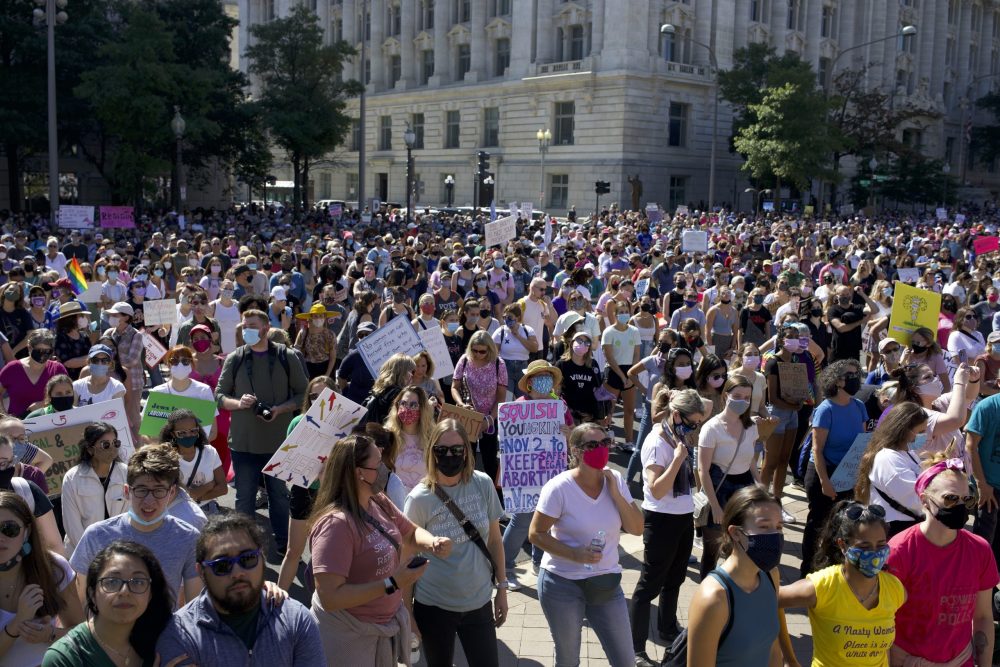WASHINGTON – The Supreme Court will hear oral arguments Monday over a Texas law that relies on private citizens to help enforce restrictions on most abortions.
Laws like the Texas Heartbeat Act go against the nearly 50-year-old precedent set by Roe v. Wade, the landmark 1973 case in which the court ruled that a pregnant person has the right to procure an abortion.
With a more conservative court, pro-choice and pro-life activists are closely watching this case, as well as a challenge to a Mississippi law that the court will hear Dec. 1.
“We are hopeful, but, of course, not certain that the Supreme Court will substantially rewrite or … overturn the terrible Roe v. Wade precedent,” Joe Pojman, executive director of Texas Alliance for Life, told Capital News Service. “This has been our hope for 48 years … that the Supreme Court will allow states to protect unborn babies from the tragedy of abortion beginning at conception, fertilization.”
Monica Edwards, federal policy manager for Unite for Reproductive and Gender Equity, a reproductive rights group, said that during their confirmation hearings, recently-appointed Justices Brett Kavanaugh and Amy Coney Barrett said they would not disrupt the Roe v. Wade precedent.
“And now, despite that, they’ve decided to take up a case that clearly violates Roe,” Edwards said. “It’s just alarming to see that this is happening. And it definitely puts abortion rights at stake.”
The Texas law restricts most abortions when a fetal heartbeat is detected, which is around six weeks after conception, and deputizes private citizens to enforce it. They can sue anyone who aids an abortion, including healthcare providers or someone who paid for an abortion, to potentially receive a reward of $10,000 or more.
The Texas law, which went into effect Sept.1, is written to be especially difficult to block, according to legal analysts.
“If Texas succeeds in this gambit, then there’s nothing to stop other states from cloning what Texas has done,” Laurence Tribe, a U.S. Constitutional law scholar and professor emeritus at Harvard University, told Capital News Service in an interview.
“And women’s rights to abortion can be sort of extinguished without meaningful judicial protection, which would be, I think, a tragedy, both for women’s rights, human rights and for the rule of law,” he said.
The Supreme Court will not focus on the constitutionality of abortion restrictions on Monday, but rather whether the federal government can sue Texas to block the law and whether the use of the public to enforce the law protects the statute from federal judicial review.
The Justice Department sued Texas, alleging the law was a violation of the Constitution.
“(The law) does not rely on the state’s executive branch to enforce the law, as is the norm in Texas and everywhere else,” said Attorney General Merrick Garland in a press conference. “Rather, the statute deputizes all private citizens, without any showing of personal connection or injury, to serve as bounty hunters.”
The law has since worked its way through lower federal courts, but currently remains in effect.
Monday’s hearing on the Texas law comes after thousands of pro-choice demonstrators gathered at the Rally for Abortion Justice in Washington on Oct. 2.
The rally was among over 650 similar gatherings across the country, a collective effort from the Women’s March organization and roughly 200 other groups.
Rig Madden, a demonstrator at the Washington rally, said the Supreme Court represents a system of oppression.
“They want women turned into incubators,” Madden said at the rally.
“Roe v. Wade is the law of the land,” he said. “Period.”
In an emotional Sept. 30 House Oversight and Reform Committee hearing, Democrats and Republicans clashed for hours over the necessity of the hearing and whether abortion should be protected.
“The ability for a woman to make a decision about the care or the ability to bring a child into this world is not something I feel rests with the government,” Rep. Brenda Lawrence, D-Michigan, said.
Lawrence said 700 women, mostly women of color, die each year from childbirth-related complications.
Low-income people and marginalized communities feel the impact of these laws most heavily, activists say.
“People who can afford to have an abortion will be able to travel out of the states, and can go to, say, their surrounding states or somewhere to get an abortion,” said Jennifer Driver, senior director of reproductive rights for the national policy organization State Innovation Exchange.
“It’s low income, it’s LGBTQ folks, it’s young people, it’s people of color who will not be able to have that access.” Driver said.
Pojman says every day the Texas law stays intact is a “victory.”
“We’re not confident, frankly, that this law is going to remain in effect indefinitely because it is not consistent with what we consider to be the terrible Roe v. Wade precedent. But for as long as it lasts, we are celebrating,” he said.
Tribe believes the response from pro-choice activists if Roe v. Wade is overturned “depends (on) whether people rise up and…are politically energized to resist this kind of tyranny.”

